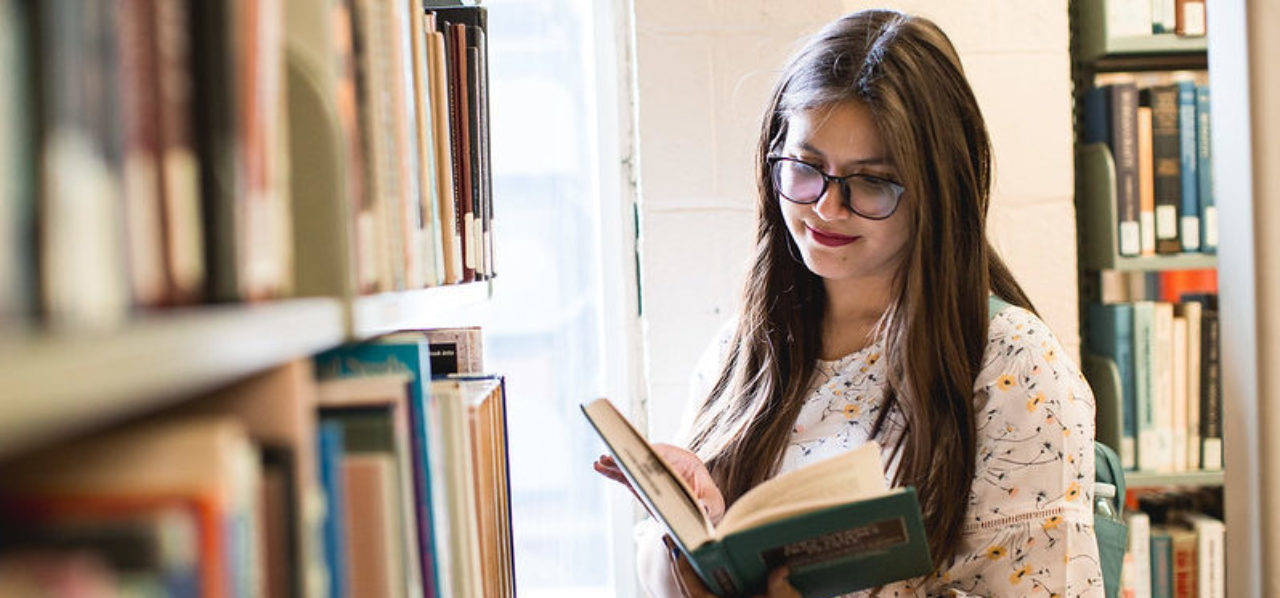Literature BA

Perhaps the most important skills that the study of literature teaches are analytic and synthetic skills. In learning to read carefully and analytically, we learn to ask hard questions both of the work and of ourselves. And as we seek to discover the relationships between the ideas and images we uncover in a work, our ultimate goal is to see the whole — to see how the parts work together to make the piece what it is. In grappling with the complex and difficult ideas contained in literature, we learn to accept the multiple dimensions and ambiguity that are so often present in life.
Finally, the study of literature will also help develop our writing abilities as we come to value the written word and understand its power to communicate.
Degree Plan
NOTE: All students are required to complete the General Education Requirements of their campus in fulfillment of their Bachelor degree requirements.
Qualified students may complete part of their undergraduate degree requirements at Wroxton College in England.
Required major courses (18 credits)
Choose 1 from each pair below, plus one additional (4 courses total)
- LITS2101: British & European Literature I
- LITS2102: British & European Literature II
- LITS2201: World Literature I
- LITS2202: World Literature II
- LITS2301: American Literature I
- LITS2302: American Literature II
Elective courses (21 credits)
At most, one 1000-level course can be counted here. HUMN or LANG courses may be appropriate to substitute with permission.
Minor is optional. Additional 15 credits of free electives will need to be taken in lieu of a minor.
QUEST/MAT Options
- BA, Literature/Quest/Preschool-Grade 3
- BA, Literature/Quest/Elementary Education
- BA, Literature/Quest/Secondary Education
- BA, Literature/Quest/Preschool-Grade 3 – TSD
- BA, Literature/Quest/Secondary Education – TSD
- BA, Literature/Quest/Elementary Special Education
- BA, Literature/Quest/English as a Second Language
- BA, Literature/Quest/Elementary Education/ESL
- BA, Literature/Quest/Secondary Education/ESL
The Degree Plan for QUEST is the same as above, except that instead of 21 credits of literature electives, the requirement is 15 credits of electives, plus:
- LITS 3311, Children’s Literature (for Elementary Education) or one course on Shakespeare (for Secondary Education)
- LITS 2030, English Grammar, or LITS 2031, The English Language
Careers
Chances are, if you are an Literature major or if you have thought of becoming one, you’ve been asked, “So you want to teach?” While it is true that some Literature majors do end up becoming teachers and professors, the English degree is dynamic. By honing their communicative, creative, critical, and expressive skills, Literature majors are well-suited to pursue a wide variety of careers not just in the classroom, but also in business, politics, creative arts, and even sciences.
Course Descriptions
-
LITS1100 An introduction to vocabulary, techniques, and critical theories involved in reading and writing about literature. Designed for Literature majors but all are welcome.
-
LITS2030 A study of the basics of grammar with emphasis on its relevance to clear and correct writing.
-
LITS2031 A skills-based introduction to the grammar and historical development of English; how does English work and how did it get to be the way it is? Designed especially for pre-service teachers, but accessible to everyone. Course historical and contemporary perspective on the language, literary uses of non- standard English, and selected topics in linguistics.
-
LITS2101 A varied and accessible survey of the literature of the British Isles and continental Europe from classical times to C.1500. Designed for Literature majors but all are welcome.
-
LITS2102 A varied and accessible survey of the literature of the British Isles and continental Europe from classical times to C.1600 to now. Designed for Literature majors but all are welcome.
-
LITS2201 Representative works of literature from around the globe, from the beginnings of literature through C.1500. Designed for Literature majors but all are welcome.
-
LITS2202 Representative works of literature from around the globe, from the beginnings of literature through C.1600 to now. Designed for Literature majors but all are welcome.
-
LITS2301 American literature from the colonial period to the nineteenth century. Designed for Literature majors but all are welcome.
-
LITS2302 American literature from the nineteenth century to now. Designed for literature majors but all are welcome.
-
LITS3311 Survey of mid- to late 20th century children?s literature to examine how this literature reflects theories and notions of childhood as well as changes within society; texts include picture and chapter books, novels, graphic novels, film adaptations, and criticism.
-
LITS4001 Advanced study and research on topics in literature and criticism; capstone course required of all seniors majoring in literature.